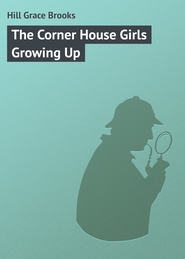По всем вопросам обращайтесь на: info@litportal.ru
(©) 2003-2024.
✖
The Corner House Girls' Odd Find
Настройки чтения
Размер шрифта
Высота строк
Поля
CHAPTER XXII – BARNABETTA CONFESSES
When Agnes reached the dining room again, the circus girl was gone. She tried the key in the lock of the cupboard door. Just as Aunt Sarah Maltby said, it would not turn. Something had fouled the lock.
“I do declare!” thought the troubled and perplexed Agnes. “This is the strangest thing. I never did want to get into this old cupboard before; but I feel now as though I’d just got to.
“There surely is something in it besides Aunt Sarah’s peppermints. Barnabetta told the truth about Aunt Sarah; but she had a personal reason for wanting to open the door, too. I’m certain of that. Dear me! What is this mystery? I want to know.”
She did not see how she could pick the lock of the closet door herself. She knew nothing about such work. Agnes wished Neale were friendly with them so that she could ask him.
And then immediately she was smitten with the thought that Neale O’Neil was another person who seemed curious about what was in the closet.
“Oh, dear me!” murmured Agnes. “What a terrible mix-up this is. What ever shall I do about it?”
Her greatest desire, next to being friends with Neale O’Neil again, was to take Ruth into her confidence about her adventure Saturday night with the mysterious burglar. But because suspicion must point directly to Neale, she could not bring herself to talk it over with her sister.
And Ruth, fearing to take anybody into her confidence regarding the real ownership of the lost treasure, was passing through a sea of troubled waters without even Agnes to confess to. The oldest Corner House girl was, at this very moment, sitting in her room trying to compose a letter to Mr. Howbridge that should reveal the whole story. She supposed the lawyer’s clerk would know how to reach him, for Ruth had forgotten that Tiverton was the name of the town to which Mr. Howbridge had been called by his brother’s illness.
With her pen poised over the page of her letter she wondered how she should word her confession to Mr. Howbridge. For Ruth felt that she, herself, was much to blame for the final loss of the treasure.
Although she blamed Neale to her sister, in her heart Ruth knew that had she been wiser in the first place, all this mystery and difficulty following the odd find in the Corner House garret, would never have arisen.
If she had done one of two things, right then and there, she saw now that the album would never have gone out of her custody.
She should either have taken Agnes and Neale into her confidence and shown them the book, and told them she had extracted one of the ten dollar bills to show to Mr. Crouch at the bank; or she should have locked the old album away in a perfectly safe place until the value of the paper could be determined.
It is only human nature to look for some scapegoat for our sins. Knowing herself to have neglected proper precautions, it was quite natural that Ruth should blame Neale. But now she blamed herself. Poor Mrs. Eland! And poor Miss Pepperill! In her heart of hearts Ruth had longed to do something worth while to help the two unfortunate ladies. And all the time a fortune belonging to them was hid away in the garret of the old Corner House.
“Oh, dear me!” she moaned, sitting over her unfinished letter. “Why should they be punished for my neglect? It is not fair!”
She heard a door open, and then voices. The sound was right on this floor.
“I tell you we’ve got to go, Pop. Well slip out of the side door and nobody will notice us. It’s gettin’ dark,” said an anxious young voice.
“I don’t see why we got to go, Barney,” responded a querulous voice.
“I tell you we can’t stay here another minute. Seems to me I shall die if we do!”
Ruth sprang up and ran softly to the door of her room. Asa Scruggs’ complaining voice retorted:
“I don’t know what’s got inter ye, Barney. You know I can’t hobble a block. These folks is mighty kind. We ain’t got a right to treat ’em so.”
“We’re treatin’ ’em better by goin’ away than by stayin’,” declared the other voice. “I tell you, Pop, we’ve got to go!”
Ruth opened her door. A lithe, boyish figure was aiding the limping clown along the passage toward the back stairway. But the face the strange figure turned to Ruth was that of Barnabetta Scruggs.
“Why! Why, Barnabetta!” gasped the Corner House girl in vast amazement.
Barnabetta was dumb. The weak mouth of the old circus clown trembled, and his eyes blinked, as he stood there on one foot, and stared, speechless, at their hostess.
“Why, Barnabetta!” cried Ruth again. “What ever is the matter?”
“We’re goin’,” said the circus girl, sullenly.
“Going where?”
“Well! we’re not goin’ to stay here,” said Barnabetta.
“Why, Barnabetta! Why not?”
“We’re not – that’s all,” ejaculated the trapeze artist.
“But I am sure your father isn’t fit to leave the house,” Ruth said. “Surely, you know you are welcome to remain till he is quite well.”
“We’ve got no business here. We never ought to’ve come,” said Barnabetta.
“Why not? You make us no trouble. I am sure you have been treated kindly.”
“What for?” snapped Barnabetta. “You folks have got no call to treat us kind. We’re nothin’ to you.”
“Oh, Barnabetta! I thought we were friends,” the Corner House girl said, really grieved by this. “I would not keep you a moment longer than you wish to stay; but I hope you understand that you and Mr. Scruggs are perfectly welcome here.
“And I don’t want you to go away in those boy’s clothes, Barnabetta. You tell me your other clothing is all in your trunk at the express office in Tiverton. Why not send for it? But the frock and other things I let you have, I meant for you to keep.”
“I don’t want ’em,” said Barnabetta, ungratefully. “If we’ve got to tramp it, I can’t be bothered with skirts.”
“But my dear!” cried Ruth, desperately, “your father can’t walk. Of course he can’t!”
“We’ve got to get down South where we can get a job with some tent show,” Barnabetta declared, deaf to Ruth’s objections.
“Mr. Scruggs! You know you can’t get there,” Ruth cried. “And if you really must go, Barnabetta – ”
“I can get a job, anyway,” said the girl.
“Then let me help you on your way. Where do you want to go? Maybe I can pay your fare and you can pay me back when – when you have luck again.”
“Hear that, Barney?” gasped Asa Scruggs. “She’s right. I can’t walk yet.”
“I’m not goin’ to take money from these girls!”
“Only as a loan?” begged Ruth.
“Aw – we’ll never get so we could pay you back,” groaned Barnabetta, hopelessly. “We’re in bad, and that’s all there is to it.”
Mr. Scruggs leaned against the wall and looked at Ruth timidly. Evidently he had been all through the argument with his stubborn daughter already.
“I cannot understand you, Barnabetta,” said Ruth, sadly. “For your father’s sake – at least, let him stay with us till his ankle is better.”
“He can stay,” said Barnabetta, quickly. “If he will.”










